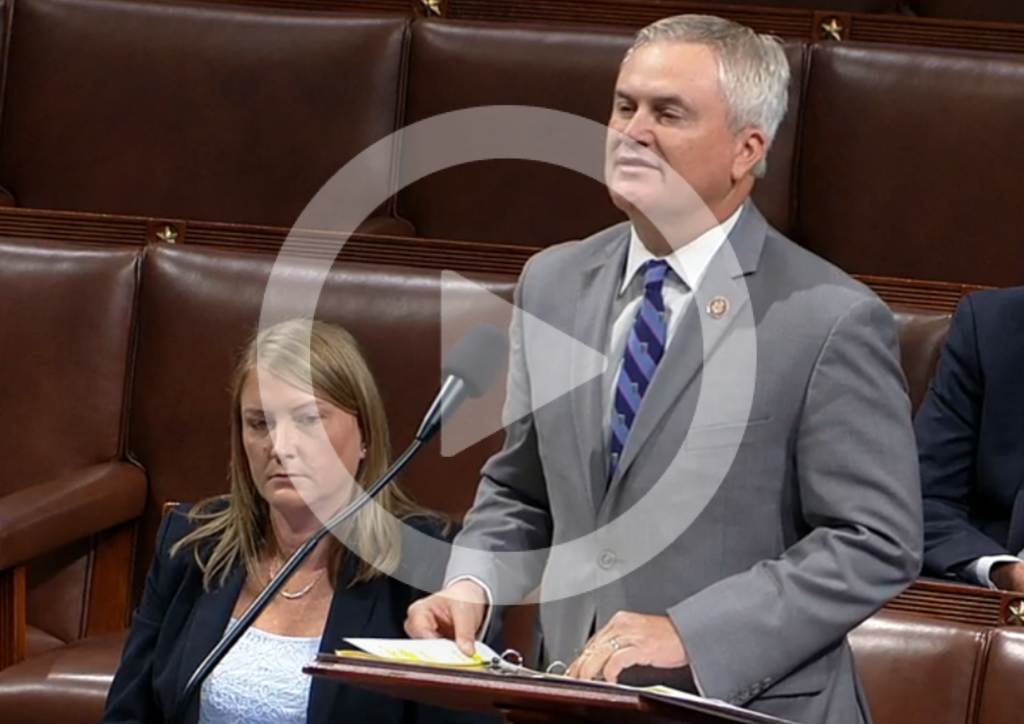Comer: Democrats Seek to Further Entrench Federal Bureaucracy
WASHINGTON—House Committee on Oversight and Reform Ranking Member James Comer (R-Ky.) today delivered remarks on the House floor in opposition to Democrats’ so-called Whistleblower Protection Improvement Act (H.R. 2988). During his remarks, Ranking Member Comer emphasized the importance of protecting whistleblowers and pointed to several laws already on the books that protect them from retaliation. However, he outlined how the Democrats’ bill makes it impossible to address performance or employment issues for anyone claiming to be a whistleblower, noting that there is a difference between retaliation and repercussions. He concluded by calling on members of Congress to oppose this bill that further entrenches the federal bureaucracy.
Below are Ranking Member Comer’s prepared remarks.
Thank you, Mr. Speaker.
I will admit the “Whistleblower Protection Improvement Act” has a great name.
Because Congress cares about protecting whistleblowers.
As the Ranking Member of the Oversight Committee, I appreciate and value whistleblowers’ service and sacrifice to make government better.
In fact, ensuring whistleblowers have protections against abuse or retaliation is a bipartisan issue here in Congress.
That probably explains why there are already so many protections that whistleblowers have access to in statutes, regulations, executive orders, and agency policies.
There’s the Whistleblower Protection Act.
The Intelligence Community Whistleblower Protection Act.
The Whistleblower Protection Enhancement Act.
The very catchy Notification and Federal Employee Antidiscrimination and Retaliation Act.
Congress has consistently sought to protect people working in the federal government who report waste, fraud, and abuse.
And for good reason.
Whistleblowers are often the only means of knowing what is happening in an agency.
And that is especially important under the Biden Administration, when the Democrats in Congress have refused to conduct any meaningful or serious oversight.
But how many more whistleblower laws do we need with so many already on the books?
Further, Republicans oppose this bill because it is a step too far.
A simple version of this bill would have just applied the existing whistleblower protections to the few corners of the federal government that aren’t already covered by the law.
However, H.R. 2988 goes much further by making it nearly impossible—and only after a long, expensive process—to address performance or employment issues in anyone claiming to be a whistleblower.
Even if the person is not really a whistleblower, but just bad at his or her job.
In the real world, if you are undermining your boss, participating in misconduct, or just lazy, your employer has options to hold you accountable.
In the federal government, if you claim you’re a whistleblower, you can be as terrible as you want, and almost any attempt to remove you from your station is characterized as “retaliation.”
There is a difference between retaliation and plain repercussions, but this bill would make them the same.
It would prohibit opening an investigation into someone who claims to be a whistleblower…even if there is good reason to investigate the employee’s conduct.
Under this bill, it would be nearly impossible to reveal the identity of a whistleblower in order to evaluate the validity of his or her claims.
In large part, this bill is just an excuse to further idolize the people who pushed the sham impeachment against former President Trump.
The actions of President Trump were, of course, vindicated by the Senate.
Entrenching federal government employees by enacting laws like H.R. 2988 is in large part why President Trump got elected in the first place: to drain the Swamp.
Democrats may be wise to remember this concern of the American people and stop working to further entrench the executive branch bureaucracy.I reserve the balance of my time.
